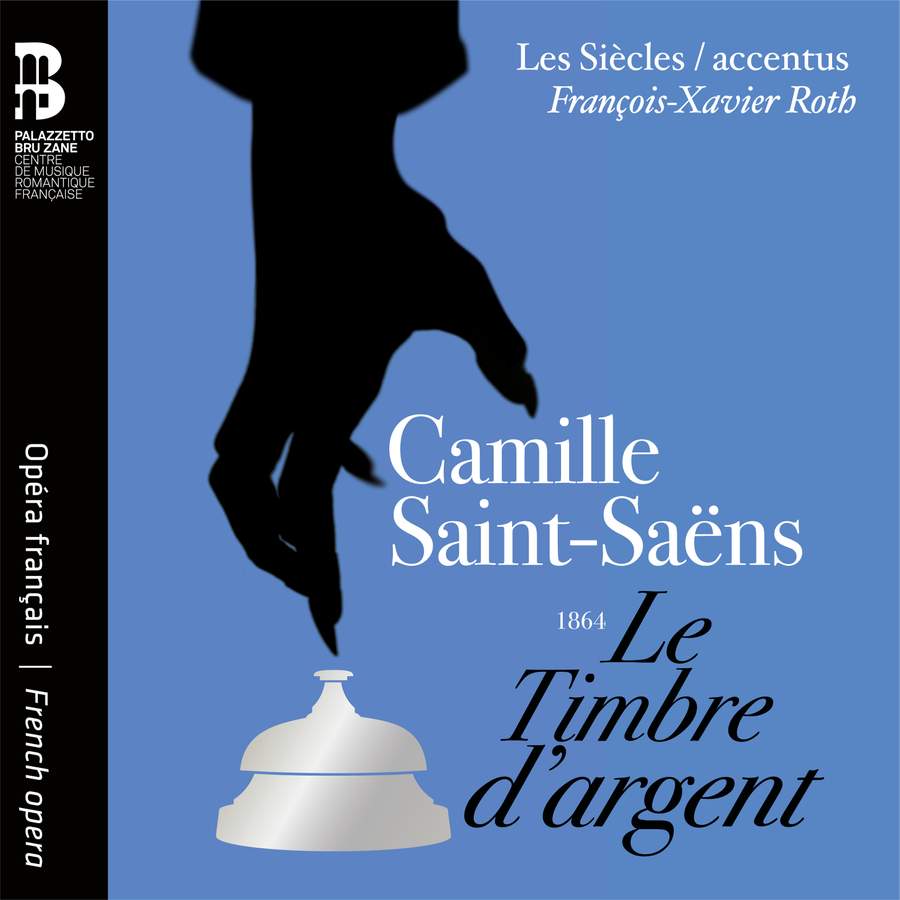SAINT-SAËNS Le Timbre d’argent (Roth)
View record and artist detailsRecord and Artist Details
Genre:
Opera
Label: Bru Zane
Magazine Review Date: 10/2020
Media Format: CD or Download
Media Runtime: 147
Mastering:
DDD
Catalogue Number: BZ1041

Tracks:
| Composition | Artist Credit |
|---|---|
| (Le) Timbre d'argent |
Camille Saint-Saëns, Composer
Accentus Ensemble Edgaras Montvidas, Conrad, Tenor François-Xavier Roth, Conductor Hélène Guilmette, Hélène, Soprano Jodie Devos, Rosa, Soprano Les Siècles Tassis Christoyannis, Spiridione, Baritone Yu Shao, Benedict, Tenor |
Author: Tim Ashley
‘It’s not an opera any more, it’s a nightmare’, Saint-Saëns wrote in 1880, when faced with a request for a potential sixth version of Le timbre d’argent (‘The Silver Bell’) for a production in St Petersburg, which, as on so many occasions in the work’s dreadful history, was eventually abandoned. Saint-Saëns’s first opera, it was commissioned in 1864 as an opéra comique for Léon Carvalho’s Theâtre Lyrique, then withdrawn during rehearsals due to lack of funds. It was subsequently rewritten with recitatives for the Opéra (which got cold feet), then again with dialogue for the Opéra-Comique (who backtracked when the Franco-Prussian war broke out) before eventually reaching the stage at the Théâtre de la Gaîté in Paris in 1877. There were umpteen more revisions before Saint-Saëns produced his final version for Brussels in 1914, which forms the basis for this wonderful recording, with the cast and forces of a 2017 revival at the Opéra-Comique.
The libretto is by Jules Barbier and Michel Carré, who also provided Gounod with Faust and Offenbach with Les contes d’Hoffmann, and there are echoes in Le timbre d’argent of both. Saint-Saëns’s protagonist is Conrad, a disaffected Austrian artist, suffering with a psychosomatic illness triggered by a conflict between love for his saintly fiancée Hélène and his obsessive desire for the ballerina-cum-courtesan Fiametta (played by a dancer), the subject of his latest painting. Pursuit of Fiametta requires money, however, and in order to acquire it, Conrad soon falls foul of the sinister doctor Spiridion, who gives him a magic bell, which fills his coffers each time Conrad rings it, but always does so at the price of the life of someone close to him. As the death toll mounts, Spiridion, like Lindorf in Hoffmann, also stalks him in multiple incarnations as a succession of potential rivals for Fiametta’s attentions, until a closing redemptive twist reveals the whole narrative to be the product of Conrad’s feverish imagination.
There are some dramaturgical wobbles and the score is uneven, though the best of it is magnificent. Carvalho’s insistence on a leading soprano role to counter Fiametta’s silent presence results in Hélène acquiring a musical prominence that the narrative doesn’t quite support. The third of the opera’s four acts is predominantly pastoral and seems anticlimactic after the second, where the diablerie is marvellous and Spiridion, in his marquis guise, at his beguiling best. A handful of Wagnerisms are sprinkled in among the Gallic elegance and wit of the rest of it: Tannhäuser was clearly on Saint-Saëns’s mind, and some of Fiametta’s music has strayed from the Venusberg.
The recording itself is tremendous, conducted with infectious energy by François-Xavier Roth, and with Les Siècles really relishing every shift of colour in Saint-Saëns’s gorgeous orchestral palette. Edgaras Montvidas is a fine, empathetic Conrad, his dark tone and passionate delivery nicely contrasted with Yu Shao’s greater refinement as the solicitous Bénédict. Hélène Guilmette does lovely things as Hélène – her Act 2 aria is particularly exquisite – while Jodie Devos, with her silvery tone, makes much of little in the ungrateful role of Rosa, Hélène’s sister and Bénédict’s fiancée. The great performance, though, comes from Tassis Christoyannis as Spiridion, beautifully voiced, seductive yet witty in his various disguises, attractive and sinister throughout. There’s fine choral singing from Accentus, while the recording itself, the occasional moment of woodwind key clatter apart, is ideally spacious. It’s immensely enjoyable, and one of Bru Zane’s finest achievements to date.
Discover the world's largest classical music catalogue with Presto Music.

Gramophone Digital Club
- Digital Edition
- Digital Archive
- Reviews Database
- Full website access
From £8.75 / month
Subscribe
Gramophone Full Club
- Print Edition
- Digital Edition
- Digital Archive
- Reviews Database
- Full website access
From £11.00 / month
Subscribe
If you are a library, university or other organisation that would be interested in an institutional subscription to Gramophone please click here for further information.




